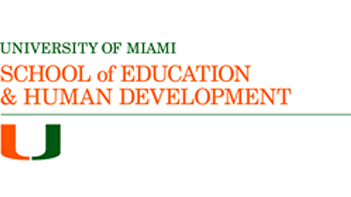UM – Studying The Motivational Edge’s Impact
Now, due to the proven success of our unique, high-impact, Arts-Based Youth Development programs, we’ve garnered the attention of the academic community. Led by a team of researchers from the University of Miami School of Education & Human Development, we have wrapped up the first round of an ongoing study, collecting qualitative data as evidence of the effectiveness of our programs.

Now, due to the proven success of our unique, high-impact, Arts-Based Youth Development programs, we’ve garnered the attention of the academic community. Led by a team of researchers from the University of Miami School of Education & Human Development, we have wrapped up the first round of an ongoing study, collecting qualitative data as evidence of the effectiveness of our programs.
ME intern and University of Miami student Margaret Goldman, joined by Dr. Laura Kohn-Wood, Chair of the Department of Educational and Psychological Studies, evaluated the impact of our Lyrical Expression program on 15 youth at AMIkids, ages 16-19. AMIkids is a day treatment facility that provides educational and re-entry training services to recent juvenile offenders from Miami-Dade County. There, through our Lyrical Expression programming, our Teaching Artists use contemporary media such as hip-hop and spoken word to engage youth in healthy self-expression and reflection.
Another youth shared, “What did I get out of the program? I got a smile out of it. I got a smile and joy out of it.”
According to the research team’s review of previous studies in the field, 84% of juvenile offenders reoffend within 5 months of re-entry, and Black youth are 16% more likely than white youth to reoffend. Goldman and Kohn-Wood believe that The Motivational Edge, through its Lyrical Expression program, can make a long-lasting impact on the lives of marginalized youth. “Hip-hop–based curricula can foster creativity and a sense of cultural belonging, and provide minority youth with mechanisms for productive self-expression,” they wrote.
Commenting on her time working on the study, Goldman said, “Conducting research on The Motivational Edge’s Lyrical Expression program was truly a moving experience. While my results empirically support the effectiveness of this program, the time I spent inside the classroom with the youth is something I will carry forever – as a researcher and as an individual.”
“In the first sessions, these kids were cold, quiet, and reserved,” Goldman continued. “By the end of the program, it was like a completely different group of adolescents – they were expressive, they were smiling, and they were enthusiastic to learn and to improve their lives.”
Goldman and Kohn-Wood have been invited to present their study, titled Reducing Recidivism in At-Risk Urban Youth Through Lyrical Expression Therapy: A Qualitative Program Evaluation, at the National Youth-At-Risk Conference planned for May of 2018. We are grateful for their dedication to this important research, and look forward to expanding the positive impact of our programs on South Florida’s youth.
Click here to view a poster summarizing the research team’s process and results.
Since 2008, we’ve watched our youth develop into talented artists and thoughtful citizens, each a testament to the efficacy of our programs in providing a safe space for artistic self-expression and personal growth.
Now, due to the proven success of our unique, high-impact, Arts-Based Youth Development programs, we’ve garnered the attention of the academic community. Led by a team of researchers from the University of Miami School of Education & Human Development, we have wrapped up the first round of an ongoing study, collecting qualitative data as evidence of the effectiveness of our programs.
ME intern and University of Miami student Margaret Goldman, joined by Dr. Laura Kohn-Wood, Chair of the Department of Educational and Psychological Studies, evaluated the impact of our Lyrical Expression program on 15 youth at AMIkids, ages 16-19. AMIkids is a day treatment facility that provides educational and re-entry training services to recent juvenile offenders from Miami-Dade County. There, through our Lyrical Expression programming, our Teaching Artists use contemporary media such as hip-hop and spoken word to engage youth in healthy self-expression and reflection.
“I’m becoming a better person,” said another youth, “and I’ll probably be able to talk to younger ones about life situations and stuff that can cause them to actually do something better in life.”
Another youth shared, “What did I get out of the program? I got a smile out of it. I got a smile and joy out of it.”
According to the research team’s review of previous studies in the field, 84% of juvenile offenders reoffend within 5 months of re-entry, and Black youth are 16% more likely than white youth to reoffend. Goldman and Kohn-Wood believe that The Motivational Edge, through its Lyrical Expression program, can make a long-lasting impact on the lives of marginalized youth. “Hip-hop–based curricula can foster creativity and a sense of cultural belonging, and provide minority youth with mechanisms for productive self-expression,” they wrote.
Commenting on her time working on the study, Goldman said, “Conducting research on The Motivational Edge’s Lyrical Expression program was truly a moving experience. While my results empirically support the effectiveness of this program, the time I spent inside the classroom with the youth is something I will carry forever – as a researcher and as an individual.”
“In the first sessions, these kids were cold, quiet, and reserved,” Goldman continued. “By the end of the program, it was like a completely different group of adolescents – they were expressive, they were smiling, and they were enthusiastic to learn and to improve their lives.”
Goldman and Kohn-Wood have been invited to present their study, titled Reducing Recidivism in At-Risk Urban Youth Through Lyrical Expression Therapy: A Qualitative Program Evaluation, at the National Youth-At-Risk Conference planned for May of 2018. We are grateful for their dedication to this important research, and look forward to expanding the positive impact of our programs on South Florida’s youth.